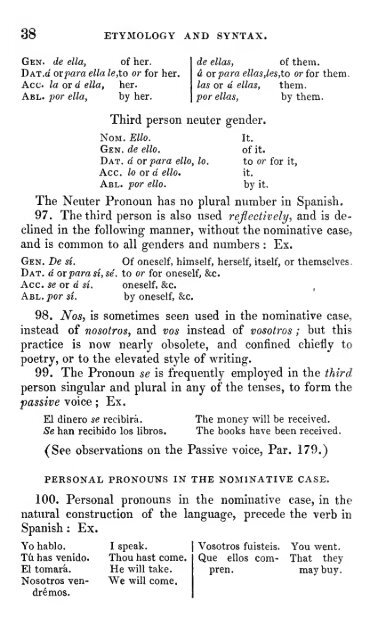A concise and simplified grammar of the Spanish language
A concise and simplified grammar of the Spanish language
A concise and simplified grammar of the Spanish language
You also want an ePaper? Increase the reach of your titles
YUMPU automatically turns print PDFs into web optimized ePapers that Google loves.
38 ETYMOLOGY AND SYNTAX.<br />
Gen. de ella, <strong>of</strong> her.<br />
DAT.a orpara ella le,to or for her.<br />
Ace la or a ella, her.<br />
Abl. ¡Jor ella, by her.<br />
Third person neuter gender.<br />
de ellas, <strong>of</strong> <strong>the</strong>m.<br />
á or para ellas,les,to or for <strong>the</strong>m.<br />
las or a ellas, <strong>the</strong>m.<br />
por ellas, by <strong>the</strong>m.<br />
NoM. Ello. It.<br />
Gen. de ello. <strong>of</strong> it.<br />
Dat. d or para ello, lo. to or for it,<br />
Ace, lo or d ello. it,<br />
Abl. por ello. by it.<br />
The Neuter Pronoun has no plural number in <strong>Spanish</strong>.<br />
97. The third person is also used reflectively, <strong>and</strong> is de-<br />
clined in <strong>the</strong> following manner, without <strong>the</strong> nominative case,<br />
<strong>and</strong> is common to all genders <strong>and</strong> numbers : Ex.<br />
Gen. De si. Of oneself, himself, herself, itself, or <strong>the</strong>mselves.<br />
Dat. a or para si, sé. to or for oneself, &c.<br />
Ace. se or a si. oneself. &c. ,<br />
Abl. por sí. by oneself, &c.<br />
98. Nos, is sometimes seen used in <strong>the</strong> nominative case,<br />
instead <strong>of</strong> nosotros, <strong>and</strong> vos instead <strong>of</strong> vosotros ; but this<br />
practice is now nearly obsolete, <strong>and</strong> confined chiefly to<br />
poetry, or to <strong>the</strong> elevated style <strong>of</strong> writing.<br />
99. The Pronoun se is frequently employed in <strong>the</strong> third<br />
person singular <strong>and</strong> plural in any <strong>of</strong> <strong>the</strong> tenses, to form <strong>the</strong><br />
Ex.<br />
passive voice ;<br />
El dinero se recibirá. The money will be received.<br />
Se han recibido los libros. The books have been received.<br />
(See observations on <strong>the</strong> Passive voice, Par. 179.)<br />
PERSONAL PRONOUNS IN THE NOMINATIVE CASE.<br />
100. Personal pronouns in <strong>the</strong> nominative case, in <strong>the</strong><br />
natural construction <strong>of</strong> <strong>the</strong> <strong>language</strong>, precede <strong>the</strong> verb in<br />
<strong>Spanish</strong> : Ex.<br />
Yo hablo. I speak. ] Vosotros fuisteis. You went.<br />
Tú has venido. Thou hast come. Que ellos com- That <strong>the</strong>y<br />
El tomará. He will take. pren. may buy.<br />
Nosotros ven- We will come,<br />
drémos.

















